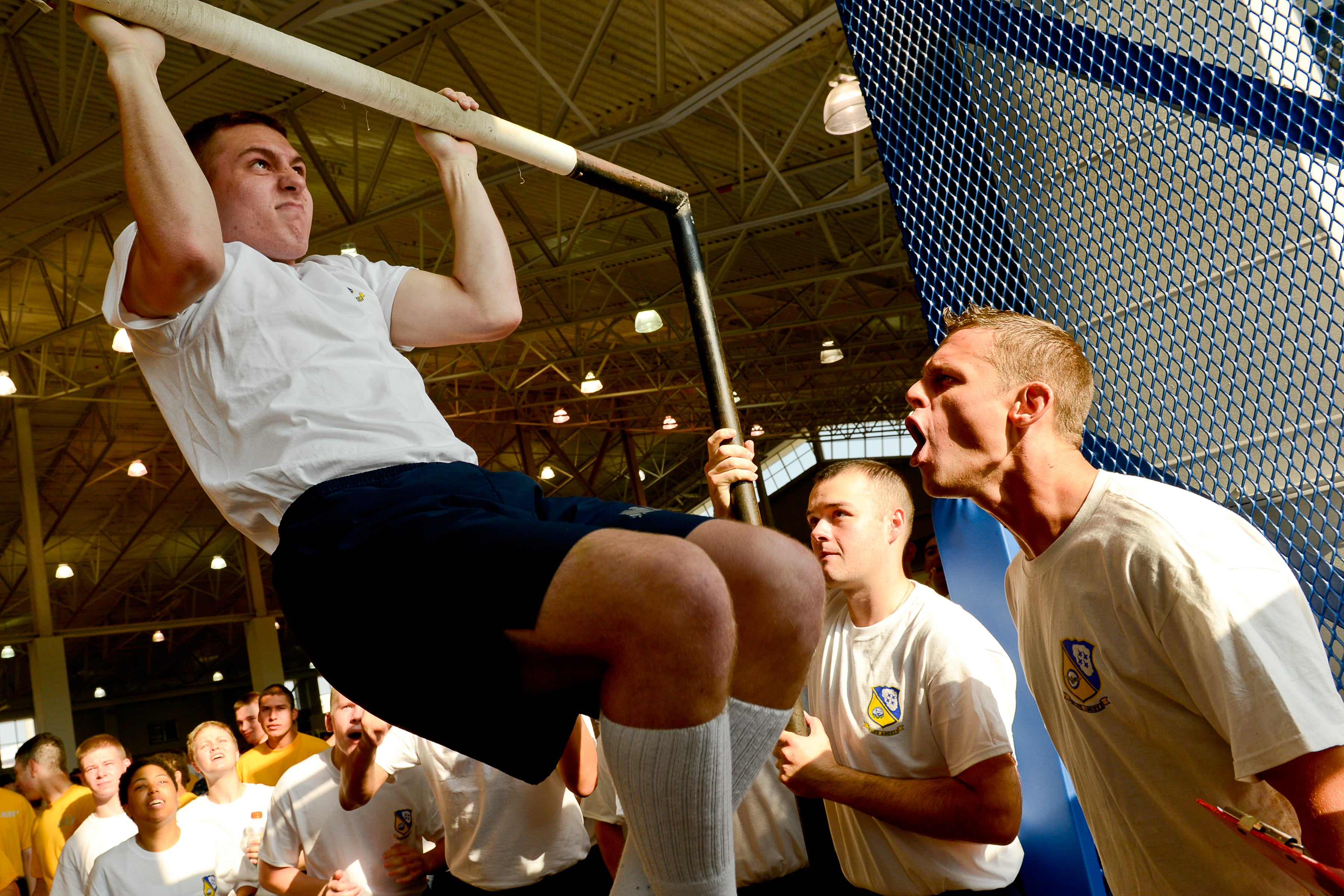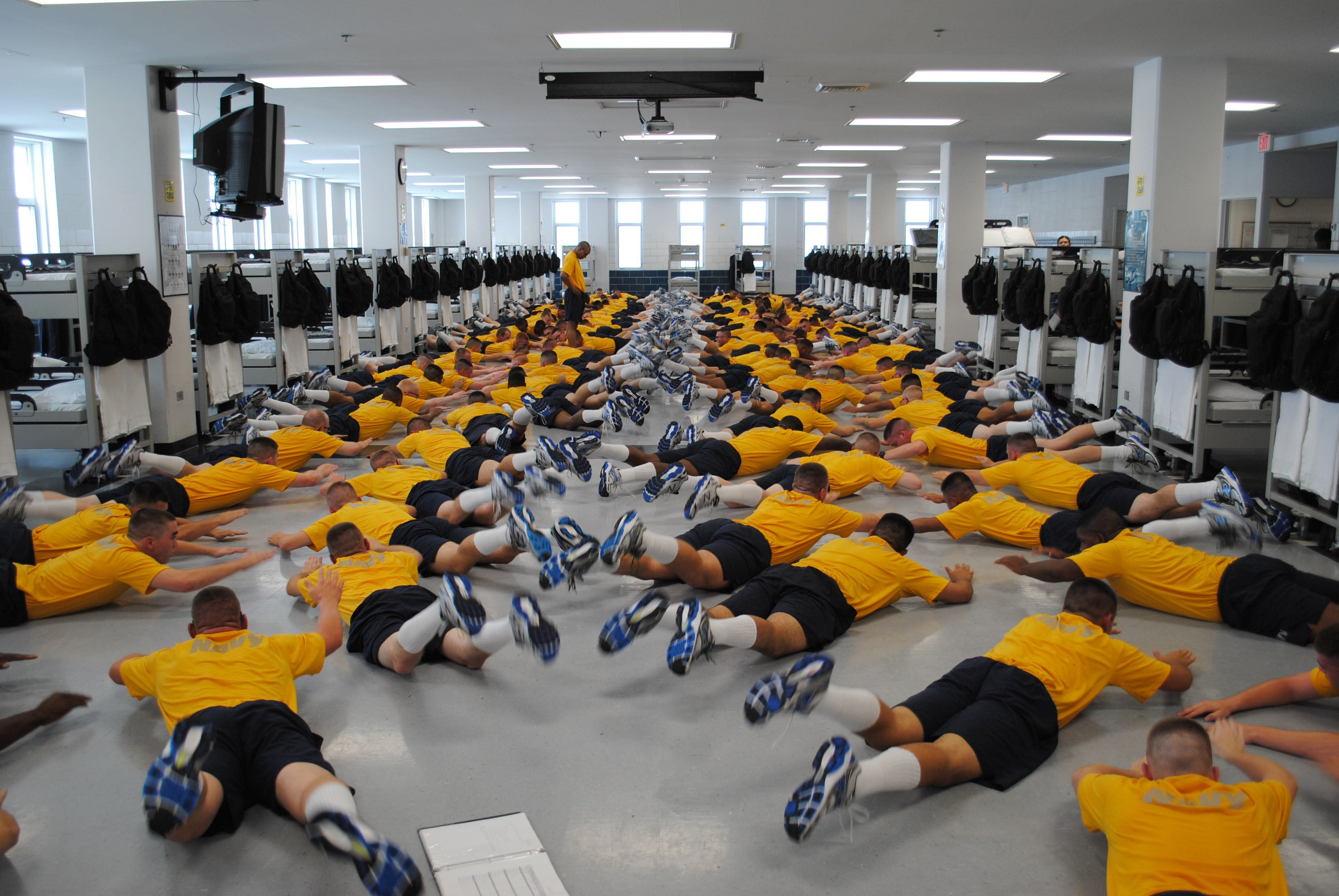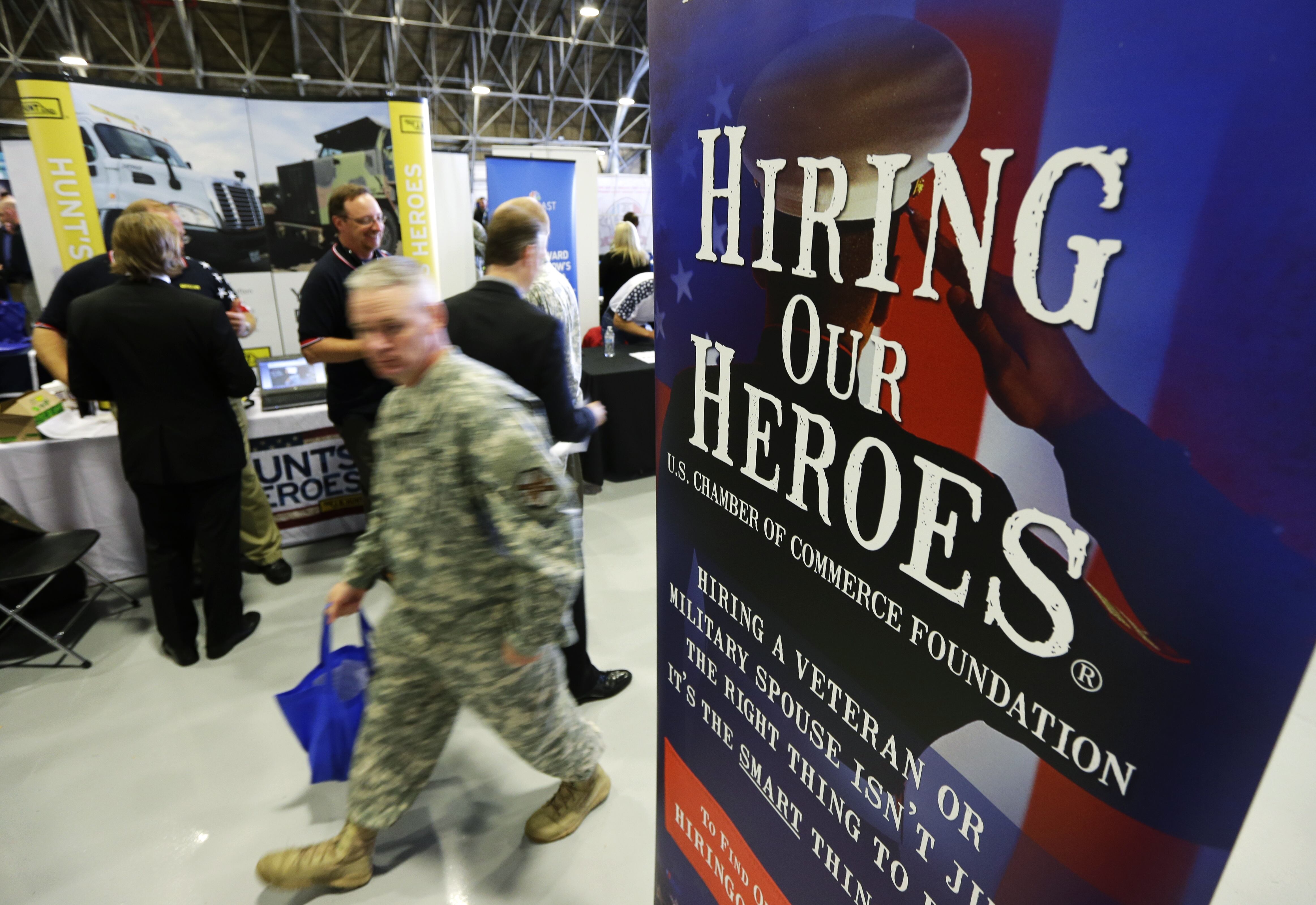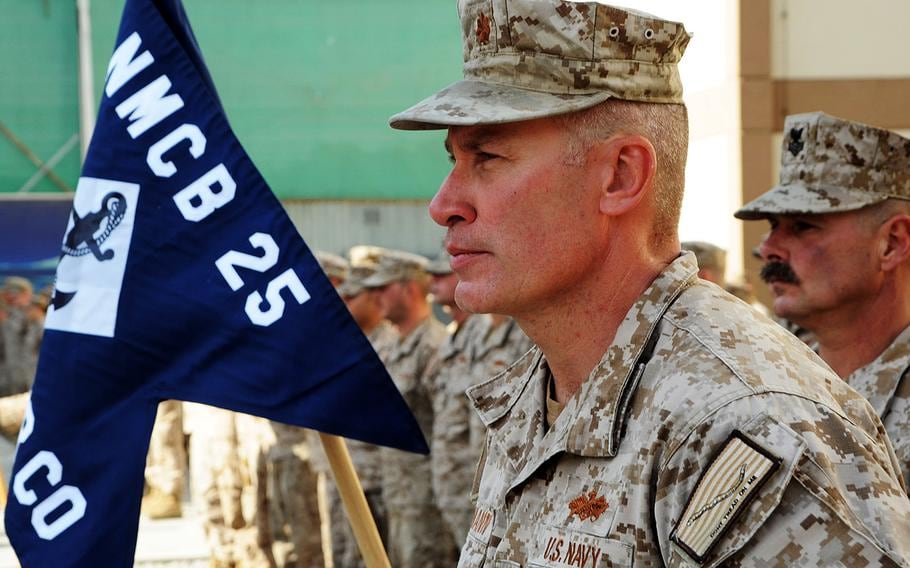When two junior sailors were caught fudging their physical readiness test scores for a physical test on their first day at nuclear field 'A' school in Charleston, South Carolina, they had a surprising - and unsettling - explanation.
It was simply what they'd learned to do at boot camp.
Their recruit division commander at boot camp had made it clear that "their partners should never fail the push-ups and sit-ups," according to a new report on into the PT cheating.
The revelation at charge launched officials on a months-long inquest with investigation in which over 500 that interviewedhundreds of recruits and sailors were interviewed in search of the ground truth about physical training at fitness at Recruit Training Command Great Lakes, Illinois, the institution responsible for molding civilians into sailors, fit and mentally prepared for the demands of service. What they uncovered was troubling.
Trainees routinely cheated during final physical fitness tests and were encouraged to do so by the RDCs responsible for training them, and who serve as their role models, according to a newly released RTC report. Of 100 sailors surveyed by Naval Nuclear Power Training Command, 42 reported that their RDCs and other RTC staff had told them, explicitly or by implication, to cheat on the PRT. ose training them.
Indeed, 14 of those students admitted they'd never passed boot camp's final physical test.
Recruits routinely inflated the numbers of correctly completed repetitions of pushups and situps when reporting scores during the fitness test; there is no indication of similar cheating on the run portion, which is typically considered the hardest part of the test given semiannually in the rest of the Navy.
The investigating officer — a Navy commander, whose name was redacted in the report provided to Navy Times —
"Cheating by recruits on the final PRT is a common practice that is contrary to the Navywide standard for administering a PRT and the RTC Maxim," the investigating officer wrote in the report. This officer's name, like nearly all others, was removed from the official report by officials out of privacy concerns. his opinions of the case.

One of boot camp's foremost goals is to get recruits up to fleet fitness standards. Aviation Support Equipment Technician 1st Class Justin Kramer, maintenance and support team member of the Navy's Blue Angels, motivates a pull-up participant at Captain's Cup at Recruit Training Command Great Lakes, Ill., in August. Members of the Blue Angels went to RTC in support of Navy Recruit Division 940, the Blue Angels-sponsored division.
Photo Credit: MC2 Kathryn E. Macdonald/Navy
It wasn't happening in a vacuum, either. The investigation concluded RDCs encouraged and condoned misreporting test scores. Recruits' fitness scores were part of the ranking system for RDCs, leading to a perverse incentive for some to cheat. And in his opinion, this wasn't being done in a vacuum, either, that recruits were being encouraged directly or indirectly to cheat.
"Some RDCs have encouraged or implied that recruits cheat on the final PRT," the commander wrote in the findings.
Statements from recruits back this up. Some were as they were told by their recruit division commanders directly and indirectly to ensure everyone passed the test by either counting sloppy pushups or situps, or by attempt as a proper repetition, even if it was incorrectly done or simply adding repetitions to what was completed.
"Add 15 pushups and 15 situps to everybody's score," one RDC reportedly told his division. "There is not any reason that anyone should fail the pushup/situp portion of the PFA."
Officials say the cheating was limited to the PFA's exercise portions, and that there's no evidence it was directed by command leaders. There's no evidence it was directed by command leadership, officials say.
"I don't believe there is a culture of cheating that exists at RTC," said Rear Adm. Richard Brown, commander of Navy Service Training Command, which overseas all accession training into the Navy, with the exception of the U.S. Naval Academy.
"I'm also not naive, that there are not individuals that didn't live up to the core values we're teaching, both on the [recruit division commander] side and on the recruit side."
What it came down to, he said, was individuals, both recruits and trainers, making individual decisions to cheat or to encourage itcheating. When leadership received the allegations of cheating, they quickly moved to get to the bottom of it, he said. was handed the allegations that cheating was going on — they sought to get to the bottom if it.
![130507-N-DT702-048 [ID=25081523]](http://www.gannett-cdn.com/-mm-/fdd627ebc8544ee42d5b69e375024d827f82f90c/r=500x331/local/-/media/2015/03/20/GGM/NavyTimes/635624496000066946-Great-Lakes-walking-with-RTC-2-.jpg)
The fallout
The investigation interviewed or surveyed more than 500 recruits and sailors from multiple divisions at RTC, both from the divisions initially implicated as well as others already in training or out in the fleet.
The report identified 59 RDC's, varying in rank from second class up to chief, petty for disciplinary action. Of those, 20 RDC's ended up being implicated for in some fashion in telling or implying to their recruits that they should cheat on the final fitness tests; they these two were recommended for disciplinary or administrative action. The remaining 39 were cleared.
Of those 20, officially implicated , RTC commanding officer, , Capt.W. Douglas Pfeifle, chose to take four to captain's mast, Brown said.
* One chief petty officer pleaded guilty to charges and asked Pfeifle for the chance to set things right. According to Brown, he's "leading the charge" to eliminate the practice from RTC.
* Two other RDC's taken to mast were issuedgiven letters of instruction for their actions, but were retained at Great Lakes for duty.
* One other sailor refused captain's mast, and Pfeifle declined to take him to court-martial, Brown said. Instead, Pfeifle, due to a loss of confidence in the sailor, he was stripped the sailor of his RTC Navy Enlisted Classification and he is being transferred back to the fleet. Another implicated sailor is set to lose his NEC as well, and will be transferred, Brown said. In addition, Brown said one other of the implicated sailors also felt Pfeifle's loss of confidence and is losing his NEC, too and is also being transferred.
* Five were given nonpunitive letters of caution.
* With the exception of of the two sailors sailors stripped of their NEC's and transferred. Ten 10 other RDCs who are implicated for lesser offenses will have to complete a lesser implicated implicated RDC's as well as those punished through administrative or legal means, will all have to go through a 90-day retraining program before they're allowed to train recruits again.
Brown says there's no evidence of overt encouragement by RTC leadership to promote PFA cheating. But in the findings of the report, the investigating officer listed some policies that created a perverse incentive to could have encouraged some to cheat, such as a rule that docked the RDCs in terms of competitiveness for awards if policies and practices in regards of how RDC's are graded and rewarded that arguably could have encouraged some to cheating to gain an advantage. Those practices docked RDC's for recruits under their charge who failed fitness assessments and other tests. but also other physical and academic tests, too.
The cheating scandal isn't limited to Great Lakes, the report found. In one case, a recruit reported that her recruiter, a chief fire controlman in Baltimore, had told her how to cheat on her physical tests. And it's not totally limited to Great Lakes, either as one recruit reported to the investigator of learning how the cheating works from her recruiter, a chief fire controlman in Baltimore.
The cheating wasn't discovered at Great Lakes, though. Instead, the first allegations came to light Oct. 29 when two sailors reporting to "A" school at Navy Nuclear Power Training Command in Charleston, South Carolina, were caught cheating on a PFA given when they checking into the school.
Not every Navy school gives a PFA to new reporting recruits, though by rule, any school over ten consecutive weeks long is required to administer a PFA before a sailor leaves.
Brown said that roughly five times since he took command last June, he can recall about five instances in which questions were raised after a recruit failed a fitness test at a has he been aware of questions after a former recruit fails a fitness test at a follow-on command, inquiries about a former recruit who had failed a fitness test at a follow on command, but never before had any allegations of cheating been raised come up.
"They stated that their Recruit Division Commander at RTC told them that 'their partners should never fail the push-ups and situps,' The commander wrote of the two nuclear power sailors.
The school did their own investigation before handing the details off to RTC.
During the NNPTC that investigation, statements from 100 sailors fresh from boot camp were collected, of recently arrived recruits were received of which; 98 were eventually forwarded to Great Lakes.
Of those 98 students, 42 said that RDC's or fitness instructors giving the tests had "either expressly or implicitly stated or encouraged recruits to cheat or lie on the pushup or situp portion of the PRT" the report said. Fifty-six recruits denied similar experiences. denied any knowledge of any of the behavior.
Twenty-seven Of those 42, 27 recruits also specifically named individual RDCs as the perpetrators of those statements. In the interview, Brown said all of the allegations applied to RDCs and not the later confirmed that no fitness instructors, who are sailors stationed at Great Lakes only for that duty — were believed to have encouraged any cheating.Fourteen The report also lists statements from 14 of the Nuclear Power School students admitted they never passed the final fitness test in reality and graduated only by cheating, the report said.with the help of cheating
'Help your buddy'
Physical training at boot camp has transformed changed greatly over the years. The amount of allowed physical training is metered and gradually increased throughout training, with the goal to condition bring recruits to fleet fitness standards at least the minimum fleet level of fitness by the time they graduate, eight weeks later.
And for most this works, Brown said.
Early in the first week of training, Brown said, recruits are given a "baseline" fitness test, and at that time, he said, roughly 65 percent fail to meet the Navy's basic standards at that timefirst. The test is identical to those the exact same as that given in the fleet — pushups, situps and a 1.5-mile run. Recruits pair off and count grade each other on the pushups and situps — where the cheating occurred. The rules demand that call for only counting properly completed repetitions, be counted.
It's virtually imnot possible to cheat on the run, Brown said, as recruits are tracked with electronic chips. These are tagged to their names which are tied in their shoes and record that starting and stoppingtheir times automatically. The final fitness test comes in the sixth week of training, and Brown said ys that 95 percent of those in traineesing pass. Those who fail are sent to special divisions to build their fitness until they can pass.
"They get a total of 10 attempts to pass the final fitness assessment," Brown said. "But about one percent never do, and those are given entry level separations."
Recruits take are administered the fitness test in a large gymnasium known as Freedom Hall. Fitness instructors administer and the test is given by fitness instructors whose job it is to oversea the test, as well as PT other fitness training at boot camp.
The 80-page investigation includes hundreds of statements from recruits alleging recruit statements saying that they were either flat out told to cheat or told through implication that "no one fails the PRT" and to help their buddies out.
Failure to help a buddy achieve a passing score — by, say, inflating the numbers — or to go with the flow would get recruits and investigation found recruits were oftenlabeled ridiculed by RDC's as being "Blue Falcons" who screwed over their shipmates by allowing them to fail.
The report was based upon se findings, the report says, along with the 98 statements from Nuclear Power School, and interviews and surveys of 411 recruits at Great Lakes and 32 accused RDC's were either interviews or surveyed.
The report doesn't specify say how many of the 411 Great Lakes recruits said confirmed they saw or knew of cheating being encouraged by RDC's.
Division 218, led by a chief logistics specialist, a first class information systems technician and a second class ship's serviceman their names were redacted in the report.
Here'sSome examples of what the recruits told the investigating officer:
One fireman, whose name was redacted [name redacted]: "The day before the PRT we … were told to add 15 push-ups/sit-ups to the total and that there is no reason why anyone should fail the push-up/sit-up portion of the PRT." This statement was repeated by other seamen and fireman in the division.
One seaman, whose name was redacted, said all three of his Division 218 RDCs told recruits that the recruits were "not Navy-qualified fitness experts, and therefore not qualified to judge what was and was not a proper pushup or situp." Instead, the rule was, "If the effort was there, we should count it."
One of the RDCs, a chief logistics specialist, denied telling recruits to cheat, saying that he had only told recruits what the minimum standards to pass were. The LSC denied the overt cheating instruction, saying he only tells the recruits what the minimum standard is for the pushups, sit-ups and run are and "If all of you can do this then you will pass."
Another of these RDCs, an first class information systems technician, said her comment about "fitness experts had been misinterpreted. What she'd really said was, who was accused of the "fitness expert" statement said that what she really said was "Who is here to be a fitness instructor? Count every attempt, unless they're doing it incorrectly." or an instructor at Freedom Hall tells you not to count it." but she insisted that the statement wasn't intended to encourage cheating.
*Despite the RDC's denials of their intent — Seaman(name redacted) said he interpreted the comments as clearance to cheat, if your buddy isn't passing. He also said that "an overwhelmingly large amount of fellow recruits" agreed at the time the RDCs' statements were a "firm suggestion to lie."
Most of the RDC's interviewed denied ever encouraging or implying that recruits to cheat, and many recruits also stated they did not believe they were told to cheat, either.
The scene played out in division after division with some recruits claiming they were encouraged by similar statements by their RDC's to cheat and other recruits denying that. With RDC's either claiming they never told recruits to cheat or that their statements were misinterpreted.
In many cased in multiple divisions, recruits told the investigator that they were at once told to help out their buddies, but told that lying was wrong.
The chief naval aircrewman operator who led Division 215 admitted to scolding a recruit who had failed his partner for not doing enough proper push-ups. , said that the urging to cheat for shipmates was direct, but instead "implicitly encouraged" through intimidation by the chief.
The chief admitted telling a recruit who had failed his buddy for not doing enough correct push-ups during the initial PFA for using correct form that he was to count them all and it was the fitness instructors job to discount any repetitions.
The chief then told the grading recruit, the report says, "Congratulations, you just earned the Blue Falcon Award for the day," according to the report. says,
Though the chief says it wasn't his intent — multiple recruits agreed among themselves that was an order to cheat.
Similar scenes played out in other divisions as well, with recruits saying their RDC's warned them not to "Blue Falcon" their shipmates and the usual denials from those accused of saying it.
The "he said, she said" back and forth was so prevalent that in the end it made the sorting out the mess difficult, Brown said. As a shore command, the evidence to discipline against the sailors would have to be solid enough to stand up at a court-martial, should the sailor request it. and finding accountability very difficult, Brown said.
"[Capt.Pfeifle] did a very good job in sorting this out," Brown said. "He was carful and deliberate in his approach."
Fixing the problem
Boot camp has initiated reforms. To eliminate the temptation to "help your buddy," recruits will no longer pair off with their own division mates for when doing pushups and situps. Instead they'll conduct that portion of the test with someone from another division they don't know at all.
Until recently, recruit failures on the final PFA "factored negatively" into how RDC's are evaluatedon their performance. Those grades determine an RDC's eligibility to compete for RTC's "Distinguished Leadership Award," which annually picks the top RDC out of the more than 600 stationed at Great Lakes.
Reforms leadership award approved in July and implemented Oct. 1, a month before the cheating was uncovered, eliminated the negative scoring for PFA failures. Now the division's overall only counts the overall division score fitness score counts towards the leadership competition and it only is about five5 percent of the judging formula. and even then it only factors in now at five percent.
The report pointed out that these reforms were already underway before the cheating was discovered.
In an email response to query, the boot camp COPfeifle described went over his motivation for changing the system.
"When I became RTC CO, I reviewed the DLA instruction, and with my experience in the Navy, saw that in rewarding RDCs for low attrition, there was a potential for sacrificing quality for production," Pfeifle said. " When you reward the lack of failure instead of excellence, it is my belief that you will end up with a lesser product."
He said that there was "no evidence this was in fact the case" but as the CO, he didn't want policies that potentially risked the quality of graduates.
Though the investigator says the already enacted reforms "largely removes the previous incentive for an RDC to promote recruit cheating on the PRT" There are still some potential problems. This includes the command's "competitive flag system," under which recruit divisions compete for honors. That is another pitfall that could prompt some RDCs to rely on cheating among their charges, a concern among many RDCs, the report said. "another potential contributing factor that may lead to some RDC's to encourage recruits to cheat on the PRT," he wrote in his recommendations. His conclusion was backed, he said, by 20 of 63 RDC's he interviews who also expressed the same concerns.
Still, Pfeifle insists that boot camp is, on the whole, clean of the PT cheating. like Brown doesn't believe that cheating is rife at Great Lakes and instead think that it's being promoted by less than honorable RDC's.
"I do not think this is a cultural habit at RTC because of the values we teach, but because of the impact a single RDC can have on several divisions, any potential negative impact to the quality of our sailors is unacceptable."
Mark D. Faram is a former reporter for Navy Times. He was a senior writer covering personnel, cultural and historical issues. A nine-year active duty Navy veteran, Faram served from 1978 to 1987 as a Navy Diver and photographer.





